Greek union confederation GSEE has created an anti-Covid-19 worker information and support group.
ΣΥΣΤΑΣΗ ANTI-COVID-19 ΟΜΑΔΑΣ ΠΛΗΡΟΦΟΡΗΣΗΣ ΚΑΙ ΥΠΟΣΤΗΡΙΞΗΣ ΕΡΓΑΖΟΜΕΝΩΝ | Γ.Σ.Ε.Ε.
See GSEE report and Covid 19 pages
Coronavirus is a deadly threat to frontline public service workers – And in particular, our members in the health sector
Safe Workers Save Lives
We rely on them to save countless lives – but for them to be able to do their job, governments across the world must take stronger action now:
The ongoing Coronavirus outbreak is exposing the vital need for quality public services – especially well-staffed, resilient public health systems.
This is a matter of life and death
Video
Nurse George Poe Williams watched colleagues die as Ebola decimated the Liberian health workforce. Now, he has a message for governments around the world facing the #CoronaVirus: #SafeWorkersSaveLive. Join PSI’s Campaign now at peopleoverprofi.it
Safe Workers Save Lives
What can I do?
What can unions do?
https://publicservices.international/campaigns/safe-workers-save-lives?id=10633&lang=en
International Workers Memorial Day Tuesday, 28th April 2020 #IWMD20
Online Tribute 10.30am
We remember those we have lost. We organise in their memory
National One Minute Silence 11.00am
A moment remember those who’ve sadly lost their lives at work over the past year; to pay tribute to the sacrifice of so many workers during the pandemic; and to thank all those who continue to do vital work at great risk.
Activities on the Day
Once you register you will be emailed a Zoom link to join in.
https://www.eventbrite.co.uk/e/international-workers-memorial-day-online-event-tickets-103319730094
As part of BWI’s week-long campaign to mark the International Workers’ Memorial Day (IWMD) on 28 April, the Coordination Board of the Intergremial of Workers of the Construction and Wood Industry of Colombia (INTERGREMIAL) held its first online meeting to share and discuss perspectives on the current status of construction work amid the COVID-19 pandemic.
The meeting was attended by Nilton Freitas, BWI Regional Representative for Latin America and the Caribbean, FNV-Netherlands Consultant for Latin America, Patricio Sambonino, BWI Regional Education Officer, Nicolas Menassé, José López Posada, INTERGREMIAL General Coordinator, Manuel Fernández of SUTIMAC and other trade union leaders from the INTERGREMIAL.
López Posada said that trade unions affiliated to INTERGREMIAL are their doing their best to negotiate with companies to ensure the income and work of their members. He said that there are currently 1,901 closed construction projects in the country, which have affected 500,000 formal construction workers. This was confirmed by the Colombian Construction Chamber (CAMACOL).
Fernández, meanwhile, pointed out that the main cement companies are complying with presidential decrees. He said that unions have managed to negotiate the granting of early vacations and telework options to its members. However, he said that subcontracted workers and those who belong to the informal sector have no secured income and other means of livelihood to survive the lockdown.
 The BWI-affiliated Palestinian General Federation of Trade Unions (PGFTU) made an urgent appeal to Israeli employers to ensure the decent working conditions of Palestinian workers employed in their labour market and settlements. The union called on employers to secure the health and safety of all workers, including migrant workers from Palestine. It also said that COVID-19 regulations should be fully implemented at the workplaces, including physical distancing and full personal protective equipment (PPEs) for all workers.
The BWI-affiliated Palestinian General Federation of Trade Unions (PGFTU) made an urgent appeal to Israeli employers to ensure the decent working conditions of Palestinian workers employed in their labour market and settlements. The union called on employers to secure the health and safety of all workers, including migrant workers from Palestine. It also said that COVID-19 regulations should be fully implemented at the workplaces, including physical distancing and full personal protective equipment (PPEs) for all workers.
“Palestinians workers working for Israeli companies should be protected by the same laws on health and safety as Israeli workers, and should not risk working in unhealthy working environment without PPEs,” PGFTU Secretary General Shaher Saad said.
The PGFTU said that despite an increase in the daily wage of construction workers, from ILS 1,200 to 1,400 (US$ 334-389), during the crisis, there is still a high risk posed to workers, as the increase tempts them to take job offers without considering their health and safety. The union also warned of a similar danger, where workers are employed in medical waste facilities without providing them with internationally-recognized occupational safety and health equipment.
Palestinian workers believe that the salaries provided by Israeli employers are more than double the wages they receive from their country. However, Palestinians working for Israelis are not protected by labour laws covering Israeli workers, such as health benefits, sick leave, vacation time and other workers’ rights, including non-discrimination based on gender and religion.
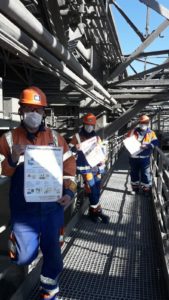 On 22 April, trade union leaders from Georgia, Kazakhstan, Kyrgyzstan, Moldova, Russia, and Ukraine held a virtual meeting to discuss their participation in BWI’s workers’ memorial week campaign. They also discussed lockdown measures in their countries, necessary courses of action to take to protect workers’ rights and income, and constraints on and opportunities for trade union actions during and after the pandemic.
On 22 April, trade union leaders from Georgia, Kazakhstan, Kyrgyzstan, Moldova, Russia, and Ukraine held a virtual meeting to discuss their participation in BWI’s workers’ memorial week campaign. They also discussed lockdown measures in their countries, necessary courses of action to take to protect workers’ rights and income, and constraints on and opportunities for trade union actions during and after the pandemic.
“In Georgia, we witness an outstanding shift in how workers are perceived. Workers are on the frontlines of the economy. We are not on a total lockdown, so some of the building materials companies and construction sites continue to work. Constructions workers are building hospitals to help overcome the pandemic crisis. We are not allowed to do safety inspections on the construction sites, but we keep in contact with our members, provide them education and information materials on COVID-19 safety measures, and urge employers to comply with national and international standards” – said Marina Kurtanidze, President of Georgian Building and Forestry Workers Trade Union.
“In Kazakhstan, since 20 April 20, all construction sites are back to work under the condition of strict compliance with COVID-19 measures. This happened on the eve of workers’ memorial week and our trade union produced a campaign video to call on employers to comply with safety measures on construction sites, including physical distance, face masks for every worker, safe transportation and accommodation, sanitizers and handwashing stations, sanitation of work tools and workplaces, and daily health screening for all workers”. – according to Kuseyn Esengazin, president of the Kazakhstan Building and Communal Workers Trade Union.
“In Kyrgyzstan, the lockdown is quite strict, but some construction companies and construction sites continue to work. We work individually with our members to provide them legal support and we have organized a webinar to inform members about safety measures on construction sites and workers’ rights. We take this COVID crisis as an opportunity to revive labour inspection, which was almost destroyed” – said Eldiar Karachalov, vice president of the Kyrgyzstan Building Workers Trade Union.
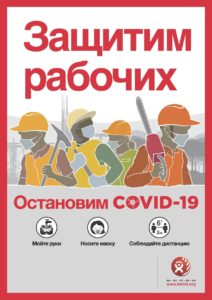 “In Ukraine, our top priority is to ensure safety of construction workers and secure workers incomes. Unfortunately, during these difficult times, some of the employers don’t pay workers’ wages, explaining that this is due to the COVID-19 crisis. This put our members in extremely vulnerable situations, as they get neither their wages nor unemployment benefits. We are preparing public actions, concerning vulnerability and safety measures, to draw public attention to this unacceptable situation”. – said Vasyl Andreyev, PROFBUD president.
“In Ukraine, our top priority is to ensure safety of construction workers and secure workers incomes. Unfortunately, during these difficult times, some of the employers don’t pay workers’ wages, explaining that this is due to the COVID-19 crisis. This put our members in extremely vulnerable situations, as they get neither their wages nor unemployment benefits. We are preparing public actions, concerning vulnerability and safety measures, to draw public attention to this unacceptable situation”. – said Vasyl Andreyev, PROFBUD president.
“In Moldova, we are in very difficult situation. The government announced a state of emergency in the country. All decisions are to be made by the State of Emergency Council. Trade unions and employers are not included in this Council, so government makes unilateral decisions which are not in favour of working people. Almost all construction sites are closed with workers sent home without wages. We are using every opportunity to call on the government to consider trade union positions to secure workers income and protect jobs” – said Victor Talmach, SINDICONS president.
“In Russia, wood and forestry sectors continue to operate. Some of the companies in the wood sector had to partially shut down their production due to lack of demand. In this respect, workers income and health and safety measures on the worksites are our key priority. At nearly every workplace, what are called Antivirus committees were organized where trade union representatives are present. We want to ensure that all the decisions related to COVID-19 measures at the work place are made with consideration of the trade union position” – said Denis Zhuravlev, president of the Russian Timber Workers’ Trade Union.
“We will never forget 2020. Not just for the way the virus turned our lives upside down and taken many people away from us too soon. We will also remember it for re-calibrating our perception of what is important and who our key workers are.
“This is the year when people from different walks of life put their lives on the line to keep vital services running. Too many of them have lost their lives, and we will remember them on International Workers’ Memorial Day.
“Every year on 28 April, millions of trade unionists across the world come together to remember those who have died at work and fight for the rights of the living.
“This year will be particularly poignant. Wherever we are working, with a minute’s silence at 11am, we will commemorate the workers who have lost their lives during the COVID-19 pandemic, and show our solidarity with those who continue to do vital work at great risk.
“Many Prospect members are working under the cloud of the virus, keeping the lights on, ensuring we are safe and running our public services. As a union, we send our thoughts to all members working at this difficult time.
Learning lessons
“28 April is not a day to point a finger at those who should have done more to protect those at risk, or to ask why our country has been caught unprepared for the pandemic. But those questions will be asked, and we must learn the lessons from this crisis. We must ensure there will not be the loss of life like this again.
“International Workers’ Memorial Day reminds us of the vital role of union health and safety representatives.
“Up and down the country, dedicated trade unionists continue to use their professional expertise to keep their workplaces and colleagues safe. This will only become more important in the weeks and months ahead as we emerge from the crisis and return to something that resembles normal.
“For many, returning to the workplace will be a considerable source of anxiety. It will be hard to roll back the mind-set we have formed to keep ourselves, our loved ones and our communities safe.
“That is why we will always follow the best scientific advice. We will draw on this as we represent members, and apply its rigour in ensuring that risks are managed.
“We know that, as the lockdown is lifted, social distancing will need to be retained. Many work tasks will need to be changed to ensure they can be carried out safely.
“In doing so, there is much that can be learnt from our members who have continued to go into work during this crisis. But this can only happen following constructive engagement between employers and unions. We have already made the case directly to government to ensure the economy can recover when work resumes.
“We expect the same seat at the table to negotiate a safe return to work with all the employers we deal with. We want to extend this hand of partnership into other areas where Prospect members are working, but maybe not currently recognised.
Engaging in good faith
“A return to work after this unprecedented lockdown will require great skill and reassurance. More than ever, it will be vital that employers are honest and transparent in their plans, and engage with the union in good faith.
“New work routines will be required and the same innovation shown during the lockdown will be needed as offices reopen. The workplace may never look quite the same as it did before.
However it changes, and whatever challenges it throws up, we will provide the pragmatic, sensible advice and representation needed based on our years of experience as the leading health and safety union.
“We should remember, too, that many members will return to the workplace having experienced the loss of loved ones, be that family, friends or colleagues. Employers will need to have appropriate support in place to help them through the difficult times, and we will work with them to do that.
“There has never been a more important time for employers to recognise the valuable knowledge of its workforce. This will needed as never before if we are to beat this terrible virus.”
Mike Clancy is Prospect general secretary.
https://prospect.org.uk/news/iwmd20-unions-are-vital-for-future-workplace-safety/
The International Chamber of Shipping and its global network of national member associations and the International Transport Workers’ Federation and its 215 seafarers’ unions are calling on seafarers across the world to sound their ships’ horns when in port at 12.00 local time on International Workers’ Day on 1 May 2020.
International Workers’ Day – or Workers’ Day, May Day or Labour Day – is recognised in many countries around the world to celebrate and acknowledge the contribution made by workers across the world.
The ICS and ITF are encouraging the gesture of solidarity to recognise over 1.6 million seafarers across the world, the unsung heroes of global trade, who are keeping countries supplied with food, fuel and important supplies such as vital medical equipment not only through the Covid-19 pandemic, but every day. Prior to engaging in blowing the horns ships should ensure that appropriate clearance is sought where required.
Guy Platten, Secretary General of the International Chamber of Shipping said, “Our seafarers are the unsung heroes of global trade and we must not forget the contribution that they are making every day to keep our countries supplied with the goods that we need. The sounding of a ships’ horn in ports on the day that the world recognises the contribution of workers is an ideal way to remind us all of their sacrifice. They are all Heroes at Sea.”
Stephen Cotton, General Secretary, International Transport Workers’ Federation (ITF) said, “The ITF welcomes this initiative and call on seafarers to sound their ships’ horns in a global expression of solidarity, but importantly to also ensure that the spotlight remains on how critical seafarers are to ensure that essential goods continue to be transported around the world during this crisis. Governments should see this as a call to action to facilitate crew changes and the free movement of seafarers so that they can continue to keep supply chains moving in these unprecedented times.”
Shipping plays a fundamental part in global supply chains, but the issue of crew changes is posing major threat to the safe operation of maritime trade. Due to travel restrictions related to COVID-19, the industry has seen seafarers extending their time onboard ships after lengthy periods at sea. The current situation cannot last indefinitely for the safety and wellbeing of seafarers.
The ITF and ICS also repeated calls on governments to facilitate the free movement of seafarers, following on April 7, and a joint letter from ICS and International Air Transport Association (IATA).
Jointly, the ITF and ICS are calling on governments to:
ICS and ITF have also produced letters of authorisation to help seafarers and authorities recognise the key worker status of transport workers operating with legitimate authority. Shipping companies can the use the facilitation letter template, copy the text on company headed paper, fill in the seafarer’s individual details and share the filled in certificate with each of their affected seafarers, provided they have undergone the required medical screening. The letter states “This facilitation letter certifies that this seafarer should be allowed free passage to travel between their home and their vessel and has participated in a medical screening.” The letter can be downloaded here.
For more information please contact:
ITF: media@itf.org.uk
ICS: ICS@woodrowcommunications.com
IndustriALL’s manual for health and safety activists is a resource for union health and safety activists, particularly those who are just starting out. The manual, written by IndustriALL’s health and safety director Brian Kohler, provides an overview of basic structures and programmes that workers need to understand when fighting for safer and healthier workplaces.
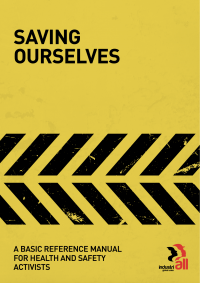 |
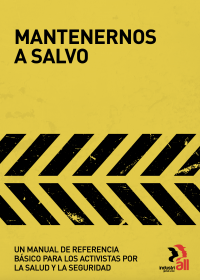 |
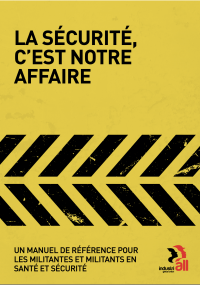 |
| ENG | SPA | FRA |
“The biggest challenge is to understand that health and safety at work is neither a perk to be bargained for nor a favour to be asked. It is our right.
“No wage is worth our health or our life, and no remedy can be granted by an arbitrator that will restore our health or our life, once it is lost.”
“If there is a quick fix, I have not found it in over 40 years of health and safety activism! Our rights are never granted easily, they must always be won by activism and determination. Indeed, every right that we now enjoy followed, and never preceded, the demands and determination and activism of people.
“There is no silver bullet; a safe and healthy workplace is the result of ongoing effort and attention.”
“IndustriALL can support union activists in their struggle by providing a framework for understanding occupational health and safety from a trade union point of view. Safe and healthy workplaces are the result of effective and overlapping safety systems: materials, tools, equipment, workplace environment, management priorities, policies, programmes, work procedures – and of course people.
“All of these must be designed, tested, educated or trained to be as safe and healthy as possible.”
“The Covid-19 pandemic that we now face is an extraordinary situation, but the principles of infection control are known and have been known for decades. Keep yourselves – especially your hands – clean. Keep equipment, tools, controls and surfaces clean. If social distancing cannot be maintained in your workplace, consider masks – but make sure you wear the correct mask and implement the mask program with appropriate education and training and auditing. (Any respiratory protection programme, whether to wear a simple surgical mask or a supplied-air respirator, needs careful implementation and follow-up to succeed.)
“Think about routes of transmission: during the commute to work and home again, at shift changes, near particular pieces of equipment, in the lunch room, washrooms – wherever people will share breathing space.
“Ensure that workers have sufficient “sick leave” so that they do not feel the need to come to work while sick. Implement a testing program when tests become more readily available. Have a plan to accommodate workers who have higher risk levels. Have a plan to deal with a worker who begins to feel symptoms while at work – how will you get them to medical care, and how will you trace and track every worker that they came into contact with?
“These are just examples, there are extensive guidelines available from the World Health Organization and from national governments and other credible sources. There is also a lot of misinformation out there, so make sure you are getting your guidance from a credible source!”
“Trade unions insist on three basic occupational health and safety rights for workers: the right to know, the right to participate, and the right to refuse or shut down unsafe work.
“The right to know means to know everything there is to know about the hazards of our work, and to receive the necessary education and training to do the job safely.
“The right to participate means to be full partners in the development and implementation of all workplace health and safety policies, programmes, procedures, accident/incident investigations, inspections, audits, risk assessments – everything. We want health and safety done with us, not “to us”. The only people with the moral authority to assess a risk are those who face the risk.
“Finally, we demand the right to refuse to perform, or to shut down, any work that a worker believes to be unsafe or dangerous to health – without negative repercussions.”
Farmworker Justice is presenting a Facebook video series ‘The state of farmworkers in the Covid-19 era’
Guest speakers include:
Farmworker Justice is collaborating with farmworker-serving organisations and many other organisations to help farmworker families confront the very serious challenges caused by the Covid-19 pandemic. Learn more here: https://